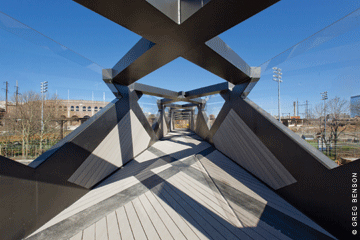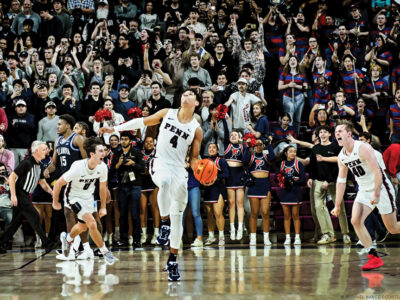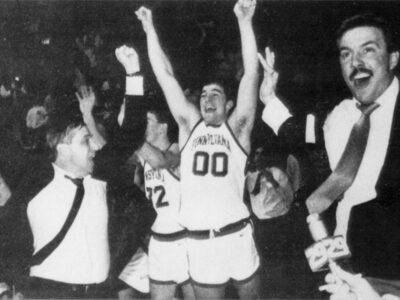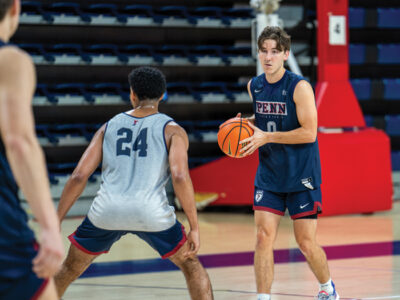
By David Porter
First things first: Glen Miller will be barking orders and haranguing the officiating crew from the sidelines next November when Penn’s men’s basketball team opens its 2009-10 season against an as-yet-to-be-named opponent. That much is known at the time of this writing, barring any seismic shifts within the athletic administration in the interim.
Whether Miller is in fact walking a tightrope as he glides across the Palestra floor is up for debate. If a growing number of concerned alumni and increasingly dissatisfied undergraduates had their druthers, he’d be required to work without a net. At worst, he would be tied up with that same tightrope and shipped back to Providence, Rhode Island, or some other outpost, and forgotten.
Such is the degree of enmity that exists in Quaker Nation after two lackluster seasons that have placed Penn squarely in unfamiliar territory as a middle-of-the-pack Ivy League team, sniffing at title contention during the final weeks of February but ultimately having to rely on other teams to do what the Quakers lately cannot—that is, beating Cornell at Ithaca.
How thin is the ice under Miller’s feet next season? Athletic Director Steve Bilsky W’71 issued a vote of confidence recently and offered a counterpoint to some of the vitriol.
“He is the coach. It’s as simple as that,” Bilsky said. “The public comments have been predominantly negative, but there’s another group of people who view it as he’s only been here a few years, he’s recruited some good players, let’s be supportive, let’s be patient.”
The level of vituperation may have been the same in the aftermath of the Quakers’ last lean period, in Fran Dunphy’s first two seasons in 1989-90 (12-14, 7-7 Ivy League) and 1990-91 (9-17, 6-8), but in those faraway days there was no Internet, no email, no Twitter, no firefrandunphy.blogspot.com. More to the point, it is doubtful that, even in possession of those tools, Brown fans were calling for Miller’s head as vociferously during his years there.
“I understand the expectation level here and the situation we’re in,” Miller said. “We can’t take back the last two years; we have to move forward and be positive and work hard, and that’s what we’re doing. I came here for a reason, and I still want to be here, and hopefully I’ll be here a long time. But I’ve been coaching basketball a long time, and I’ll be coaching someplace if not here. I’m not going to be held hostage by anybody.”
Not all the comments have been negative. Former Quaker forward and occasional New York Times sports section contributor Steve Danley C’07 offered a passionate defense of Miller on fireglenmiller.blogspot.com, calling Miller “an offensive genius.”
Hyperbole aside, there were positive developments during the 2008-09 season—just not enough of them. To even speak of the non-conference games would tax the faint of heart, so we’ll focus on the Ivy League schedule. There, the Quakers began with a rousing 66-60 win at Harvard that featured a 15-point, nine-assist performance by freshman point guard Zack Rosen. The next night at Dartmouth, Penn cast a mold that would persist for the rest of the season, losing a game that could have propelled them forward but instead put them back to square one.
In retrospect, the rest of the season can only be described as a surreal.
The Quakers were able to reverse recent history and defeat teams on the road that had previously given them fits (Yale, Princeton, Columbia), yet were unable to maintain that mastery against those same teams at the Palestra, where Ivy victories were once as much a given as lousy weather at Spring Fling.
A thrilling, 62-55 overtime win at Princeton on Feb. 17 in a game the Quakers controlled for most of the second half offered the promise of a strong finish to the season. In similar circumstances a year earlier, Penn had won five of eight games, all the while knowing that it was all but powerless to stop Cornell’s inexorable run to an undefeated Ivy season. Yet this season produced no reprise. Faced with a Cornell team that showed signs of fallibility (while still finishing 11-3), the Quakers lost five of their last seven games, including four of five at the Palestra. Remove senior Kevin Egee’s buzzer beating three-pointer at Columbia and the final tally is worse.
Injuries left the Quakers without their star shooting guard, sophomore Tyler Bernardini, for the final three games of the season, and also took a toll on juniors Darren Smith (knee), Justin Reilly (hernia), and Andreas Schreiber (shoulder), who could have been significant contributors. On the bright side, Rosen had a stellar freshman season and became the second Quaker in a row, after Bernardini, to win the Big Five rookie of the year award.
Rosen’s emergence undoubtedly played a role in the decision of sophomore point guard Harrison Gaines to announce after the season that he would transfer. He joined sophomore forward Remy Cofield, who left the team during the season.
“You see it all over the country, players leaving a program for whatever reasons,” Miller said. “I was a transfer myself. When you recruit a kid you don’t like to see him leave. For whatever reason, it didn’t work out, and you move on. No one wants to see it, but it happens. In some cases it’s the best for everybody.”
Miller was to participate in a town meeting at the end of April, an event that was envisioned before the season and not in response to recent events, Bilsky said. Still, it seems a tacit admission that three years in, Miller has not quite been welcomed into Quaker Nation with open arms—or vice versa. Of course, a five- or six-game winning streak tends to render these discussions moot. The question is, how long will the Palestra partisans have to wait?
“Obviously we had a little rebuilding to do and people expected that,” Miller said. “But this year we fully expected improvement, and it didn’t happen. This is the first year in my coaching career that I can remember a team didn’t show significant improvement as the season moved along, and that’s a disappointment. But you can sink your head or you can keep your chin up and come to work with a positive approach and try to get better, and that’s what we’re doing.”
David Porter C’82 writes for the Associated Press.




